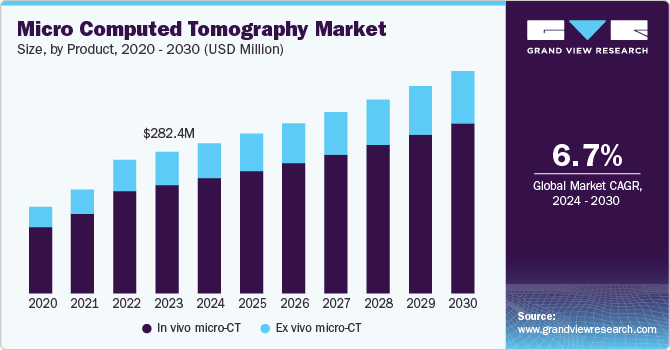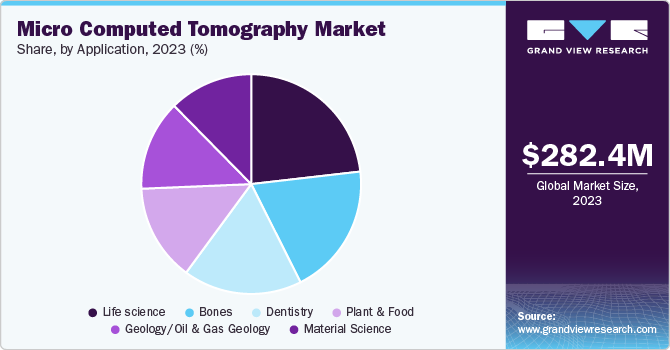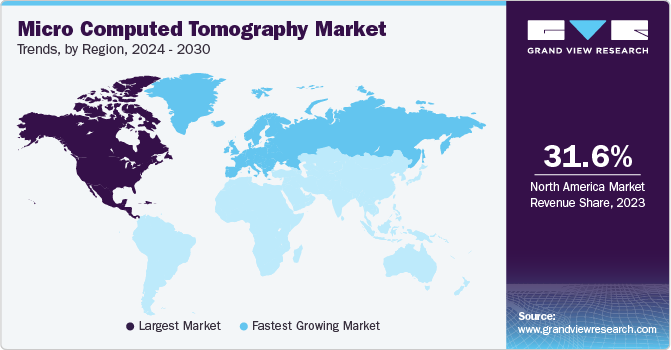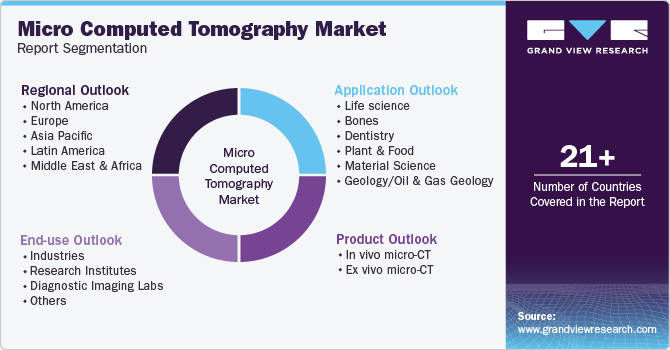
Micro Computed Tomography Market Size, Share & Trends Analysis Report By Product (In-vivo, Ex-vivo), By Application (Life Science, Bones, Dentistry, Plants & Food), By End-use, By Region, And Segment Forecasts, 2024 - 2030
- Report ID: GVR-4-68039-639-7
- Number of Report Pages: 100
- Format: PDF
- Historical Range: 2018 - 2022
- Forecast Period: 2024 - 2030
- Industry: Healthcare
Micro Computed Tomography Market Trends
The global micro computed tomography market size was valued at USD 282.4 million in 2023 and is projected to grow at a CAGR of 6.7% from 2024 to 2030. Continuous improvements in micro-CT technology are significantly driving market growth. The arrival of higher resolution imaging has enabled researchers and clinicians to obtain more detailed and accurate visualizations of internal structures, facilitating better diagnosis and analysis. Faster scanning times have also been a critical advancement, allowing for more efficient workflows and increased throughput, which is particularly beneficial in high-demand research and clinical settings. Enhanced software capabilities have further revolutionized micro-CT, offering sophisticated image processing, analysis, and 3D reconstruction tools that streamline operations and improve user experience.

The increased use of micro-CT across a diverse range of industries is a major factor driving market expansion. In medical and dental research, micro-CT is invaluable for detailed imaging of biological tissues, aiding in the study of disease mechanisms, anatomical structures, and treatment effects. Material science benefits from micro-CT's ability to visualize the internal composition and structural integrity of materials, facilitating the development of advanced materials with optimized properties. In geology, micro-CT is employed to analyze rock and soil samples, providing insights into porosity, mineral composition, and structural features that are crucial for both academic research and industrial applications such as oil and gas exploration.
The rising investment in research and development across industries such as pharmaceuticals, biotechnology, materials science, and electronics is significantly boosting the demand for micro-CT systems. These investments are directed towards enhancing the understanding of complex structures and improving the quality of products. Micro-CT systems are essential in providing detailed internal structure analysis, enabling researchers to visualize and quantify intricate features at a microscopic level. This level of detail is crucial for innovation and the development of new products, leading to advancements in drug development, biomaterials, and electronic components.
Product Insights
The ex-vivo micro-CT segment dominated the market and accounted for a share of 76.50% in 2023. The increasing focus on biomedical research, especially in critical areas such as cancer, orthopedics, and regenerative medicine, is significantly driving the adoption of ex vivo micro-CT systems. Researchers rely on the high-resolution, detailed 3D imaging capabilities of ex vivo micro-CT to examine biological specimens with exceptional precision. In cancer research, these systems enable the visualization of tumor structures and vascular networks, enhancing the understanding of tumor progression and the effects of therapeutic interventions. In orthopedics, ex vivo micro-CT aids in the detailed analysis of bone architecture and the evaluation of orthopedic implants, driving the growth of segment.
The In-Vivo segment is expected to witness growth at 6.7% CAGR. The integration of artificial intelligence (AI) and machine learning (ML) technologies with in-vivo micro-CT systems is enhancing data analysis capabilities. AI and ML algorithms can automate image processing, improve the accuracy of measurements, and facilitate the extraction of quantitative data, making in-vivo micro-CT more efficient and effective.
Application Insights
Life science accounted for the largest market revenue share in 2023. Micro-CT is used in biomedical research to visualize and analyze the internal structures of biological specimens, such as bones, tissues, and organs. Its high-resolution imaging capabilities allow for detailed studies of anatomical and physiological changes at the microscopic level, which is crucial for advancing our understanding of various diseases. By providing precise, 3D images, micro-CT enables researchers to observe structural alterations in disease models, track the progression of conditions such as osteoporosis or cancer, and assess the impact of new treatments in preclinical studies.

The dentistry segment is expected to grow at a CAGR of 7.3% in forecast period. Micro-CT provides exceptionally high-resolution images of dental structures, including enamel, dentin, and pulp, which is crucial for a multitude of dental applications. This detailed imaging capability allows for the precise visualization of the intricate internal architecture of teeth, enabling accurate diagnosis of dental diseases and conditions that might be missed with conventional imaging techniques. In treatment planning, micro-CT aids dentists in devising more effective and targeted interventions, such as in the placement of dental implants, root canal treatments, and orthodontic adjustments, by providing a comprehensive view of the patient's dental anatomy.
End-use Insights
The research institutes segment held the highest revenue market in 2023. Research institutes are fostering scientific discovery and innovation, necessitating the use of cutting-edge imaging technologies such as micro-CT. The high-resolution imaging capability of micro-CT systems allows for the detailed analysis of complex structures at the microscopic level, which is essential for advancing knowledge in a multitude of scientific disciplines. In biology, micro-CT enables researchers to visualize and quantify intricate biological structures, such as the internal anatomy of small organisms, tissues, and cells, without destructive sampling. In materials science, it facilitates the study of the internal composition and properties of various materials, including metals, composites, and ceramics, aiding in the development of new materials with enhanced properties, driving the growth of research segment.
The diagnostic imaging labs segment is anticipated to grow significantly over the forecast period. The integration of artificial intelligence (AI) and machine learning (ML) technologies with micro-CT systems is revolutionizing data analysis capabilities in diagnostic imaging labs. AI and ML algorithms can automate the complex and time-consuming process of image processing, enabling rapid and accurate analysis of high-resolution images. These technologies enhance diagnostic accuracy by identifying patterns and anomalies that may be difficult for human observers to detect, improving the reliability of diagnostic outcomes. Additionally, AI and ML facilitate the extraction of quantitative data from micro-CT images, such as volumetric measurements, density calculations, and structural assessments, providing valuable insights for medical diagnosis and research.
Regional Insights
North America micro computed tomography market held the highest revenue market share of 31.58% in 2023. Continuous advancements in micro-CT technology have significantly enhanced imaging capabilities, offering high-resolution 3D images that are crucial for detailed analysis across various applications. This improvement in imaging precision has expanded the utility of micro-CT in both research and industrial contexts, allowing for more accurate and detailed visualization of internal structures. The integration of artificial intelligence (AI) and machine learning algorithms into micro-CT systems has revolutionized image reconstruction, analysis, and interpretation processes. These advanced algorithms optimize the efficiency and accuracy of micro-CT technology, enabling faster and more reliable results

Siemens revealed the Somatom Pro.Pulse, a cutting-edge spectral CT scanner designed for cardiac and general imaging applications, at the Radiological Society of North America (RSNA) 2023 conference. This unique device incorporates dual-source technology, which enhances imaging capabilities by providing higher image quality and resolution. This is especially beneficial in cardiac imaging, where exact precision is required. Despite its advanced features, the Somatom Pro.Pulse is priced comparably with single-source systems, making high-quality spectral CT imaging accessible to a wider range of healthcare providers.
U.S. Micro Computed Tomography Market Trends
In the healthcare sector, the use of micro-CT is rising significantly due to its application in preclinical imaging, orthopedic research, and dental care. Micro-CT provides detailed visualization and analysis, allowing researchers and clinicians to study intricate anatomical structures and disease models in small animals, which is essential for developing new treatments and understanding various medical conditions. In orthopedic research, micro-CT is invaluable for examining bone microarchitecture and assessing the efficacy of therapies for bone diseases. In dental applications, it aids in the precise evaluation of tooth and jaw structures, facilitating better diagnosis and treatment planning.
Asia Pacific Micro Computed Tomography Market Trends
Rapid industrialization in countries such as China, India, and South Korea is significantly boosting the demand for advanced imaging technologies such as micro-CT in manufacturing and quality control processes. As these nations continue to expand their industrial bases, the need for precise and non-destructive testing methods becomes crucial to ensure the integrity and quality of complex components used in electronics, aerospace, automotive, and other high-tech industries. Concurrently, increasing foreign and domestic investment in high-tech industries and healthcare infrastructure is driving the expansion of the micro-CT market. These investments are facilitating the adoption of cutting-edge technologies, enhancing research capabilities, and improving healthcare outcomes.
Europe Micro Computed Tomography Market Trends
Europe micro computed tomography market is expected to grow at fastest CAGR of 7.7% in forecast period. European governments are actively providing significant funding and grants to support research involving advanced imaging technologies, including micro-CT. This financial backing enables universities, research institutions, and industry players to explore new applications, develop existing technologies, and drive innovation in the field of micro-CT. Such funding is crucial for advancing scientific knowledge and developing cutting-edge solutions that can be applied across various sectors. Favorable regulatory frameworks across Europe play a important role in facilitating the adoption and use of micro-CT technology. These regulatory frameworks streamline approval processes, making it easier for researchers and industries to integrate micro-CT into their projects.
Key Micro Computed Tomography Company Insights
Some of the key companies in the micro computed tomography market include Bruker Corporation, PerkinElmer Inc. Organizations are focusing on increasing customer base to gain a competitive edge in the industry. Therefore, key players are taking several strategic initiatives, such as mergers and acquisitions, and partnerships with other major companies.
-
Bruker Corporation offers high-performance scientific instruments and solutions for molecular and materials research, as well as industrial and applied analysis. The Skyscan series of micro-CT products, including the Skyscan 1272 and Skyscan 2214, are intended for thorough, non-destructive investigation in fields such as biomedical research, material science, and industrial inspection. These systems provide features such as high-speed scanning, increased resolution, and the ability to handle bigger sample volumes, making them indispensable tools for researchers and professionals looking for precise and comprehensive imaging solutions.
-
PerkinElmer Inc. offers advanced micro computed tomography (micro-CT) systems designed for high-resolution 3D imaging, critical for detailed analysis in biomedical research, material science, and industrial applications. Among their notable products are the Quantum GX2 micro-CT imaging system, which delivers high-speed and high-resolution imaging for preclinical research, and the SkyScan series, which includes versatile micro-CT scanners for small animal imaging and materials research.
Key Micro Computed Tomography Companies:
The following are the leading companies in the micro computed tomography market. These companies collectively hold the largest market share and dictate industry trends.
- Bruker Corporation
- PerkinElmer Inc.
- Thermo Fisher Scientific
- Zeiss
- NeoScan
- Sanying Precision Instruments Co.Ltd
- North Star Imaging Inc
- SCANCO Medical AG
- TESCAN
Recent Developments
-
In July 2024, Thermo Fisher Scientific completed the acquisition of Olink, a provider of innovative proteomics solutions. This strategic acquisition aims to enhance Thermo Fisher's capabilities in life sciences and diagnostics by integrating Olink's cutting-edge proteomics technology, which is pivotal for high-throughput biomarker discovery and validation.
-
In August 2021, the installation and training of a Sanying Precision Instruments micro-CT system at Sejong Science and Technology Park in Korea were successfully completed. The nanoVoxel-3000 high-resolution micro-CT, featuring 500nm spatial resolution and in-situ environment loading for 4D imaging, was deployed to enhance research capabilities for universities, scientific institutions, and high-tech companies. Despite pandemic challenges, Sanying's engineers provided comprehensive training, receiving positive feedback for their expertise.
Micro Computed Tomography Market Report Scope
|
Report Attribute |
Details |
|
Market size value in 2024 |
USD 299.8 million |
|
Revenue forecast in 2030 |
USD 443.1 million |
|
Growth Rate |
CAGR of 6.7% from 2024 to 2030 |
|
Base year for estimation |
2023 |
|
Historical data |
2018 - 2022 |
|
Forecast period |
2024 - 2030 |
|
Quantitative units |
Revenue in USD million and CAGR from 2024 to 2030 |
|
Report coverage |
Revenue forecast, company ranking, competitive landscape, growth factors, and trends |
|
Segments covered |
Product, application, end-use, region |
|
Regional scope |
North America, Europe, Asia Pacific, Latin America, MEA |
|
Country scope |
U.S., Canada, Mexico, Germany, UK, France, Italy, Spain, Denmark, Sweden, Norway, China, Japan, India, South Korea, Australia, Brazil, Argentina Thailand, South Africa, Saudi Arabia, UAE, Kuwait |
|
Key companies profiled |
Bruker Corporation, PerkinElmer, Thermo Fisher Scientific, Zeiss, NeoScan, Sanying Precision Instruments Co.Ltd, North Star Imaging Inc, SCANCO Medical AG, TESCAN |
|
Customization scope |
Free report customization (equivalent up to 8 analysts working days) with purchase. Addition or alteration to country, regional & segment scope. |
|
Pricing and purchase options |
Avail customized purchase options to meet your exact research needs. Explore purchase options |
Global Micro Computed Tomography Market Report Segments
This report forecasts revenue growth at global, regional, and country levels and provides an analysis of the latest industry trends in each of the sub-segments from 2018 to 2030. For this study, Grand View Research has segmented the global micro computed tomography market report based on application, product, end-use and region.

-
Application Outlook (Revenue, USD Million, 2018 - 2030)
-
Life science
-
Bones
-
Dentistry
-
Plant and Food
-
Material science
-
Geology/Oil and Gas Geology
-
-
Product Outlook (Revenue, USD Million, 2018 - 2030)
-
In vivo micro-CT
-
Ex vivo micro-CT
-
-
End-use Outlook (Revenue, USD Million, 2018 - 2030)
-
Industries
-
Research Institutes
-
Diagnostic Imaging Labs
-
Others
-
-
Regional Outlook (Revenue, USD Million, 2018 - 2030)
-
North America
-
U.S.
-
Canada
-
Mexico
-
-
Europe
-
UK
-
Germany
-
France
-
Italy
-
Spain
-
Denmark
-
Sweden
-
Norway
-
-
Asia Pacific
-
Japan
-
China
-
India
-
Australia
-
South Korea
-
Norway
-
-
Latin America
-
Brazil
-
Argentina
-
-
Middle East and Africa (MEA)
-
South Africa
-
Argentina
-
UAE
-
Kuwait
-
-
Frequently Asked Questions About This Report
b. The global micro computed tomography market size was estimated at USD 155.3 million in 2020 and is expected to reach USD 192.1 million in 2021.
b. The global micro computed tomography market is expected to grow at a compound annual growth rate of 7.9% from 2021 to 2028 to reach USD 327.7 million by 2028.
b. North America dominated the micro-CT market with a share of 7.9% in 2020. This is attributable to the rising existence of a large number of market competitors in the region, as well as the high frequency of new product releases, both seem to be factors contributing to regional market growth.
b. Some key players operating in the micro-CT market include Bruker Corporation; PerkinElmer; Thermo Fisher Scientific; Zeiss, NeoScan; Sanying Precision Instruments Co.Ltd; North Star Imaging Inc; SCANCO Medical AG and TESCAN.
b. Key factors that are driving the micro-CT market growth include, a wide range of applications, technological advancements, and increase in use of micro CT for research and development activities
We are committed towards customer satisfaction, and quality service.
"The quality of research they have done for us has been excellent."




